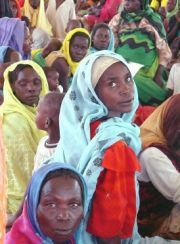WFP raises alarm over plight of Darfur refugees
DAKAR, Senegal, Apr 12, 2005 (PANA) — The UN World Food Programme warned
Tuesday that nearly 200,000 refugees who fled into Chad from
Sudan’s troubled Darfur region risk face hunger in the months
ahead, unless donations were rapidly forthcoming.

|
|
Sudanese women and children sit in front of a tent on the sand in the Kalma camp for internally displaced persons on the outskirts of the southern Darfur town of Nyala. (AFP). |
In a release, WFP appealed for 87 million US dollars in food aid
to cover needs in the refugee camps of eastern Chad until the
end of next year.
It said contributions are urgently needed to ensure sufficient
stocks are delivered to the camps ahead of the rainy season when
road transport becomes all but impossible across most of the
region.
“We need food now,” said WFP Chad Country Director Stefano
Porretti.
“With the rains only a matter of two or three months away, it is
absolutely imperative that we move food to the places where it
will be needed later this year. This process has already begun
but is far from complete,” Porretti implored.
“Once the rains begin, most of the camps become completely
inaccessible by road. Getting supplies in place now will go a
long way to avoid the necessity of expensive airlifts and air-
drops further down the line. We need to get food here by road
before it is too late,” he said.
WFP said it faces a complex logistical challenge to get food to
the camps in eastern Chad, where food sufficient for at least
three months needs to be pre-positioned ahead of the rains.
The agency noted that the southern corridor from Douala in
Cameroon would be virtually unusable during the rainy season,
putting extra pressure on deliveries across the Sahara desert
through Libya.
It said the northern corridor would become the sole lifeline to
the camps while roads in the south remain impassable, adding that
both routes require an average of four weeks for food to reach
the camps.
The agency that it would, under a revision of its current
emergency operation, also be assisting more than 150,000 Chadian
nationals as well as providing for the possibility that an
additional 150,000 people could cross the border from Darfur if
the conflict continues.
Assessment missions towards the end of 2004 found that the health
and nutritional condition of the refugees had largely improved
since a survey carried out in June, it said.
However, the missions also concluded that in many cases the local
population were facing severe difficulties in providing for
themselves after a poor agricultural season and had become ‘as
vulnerable as the refugees’.
As a consequence, WFP said it was increasing its assistance to
the local population by providing food to particularly vulnerable
groups such as young children, pregnant women, nursing mothers
and the elderly.
WFP has also initiated several schemes with its partners in which
food is earned in return for work on projects to build local
assets and infrastructure.
Among donors who have so far contributed to the WFP emergency
operation for Sudanese refugees in Chad, the agency cited the US
($30 million), UK ($4.1 million), Germany ($3.6 million), France
($2.6 million), Canada ($ 2.5 million) and the European Community
($2.4 million).
Others are the Netherlands ($1.88 million), Switzerland ($1.61
million), Australia ($625,000), Norway ($593,000), Ireland
($530,000), Japan ($425,000), Finland ($249,000) and the United
Arab Emirates ($116,000).
